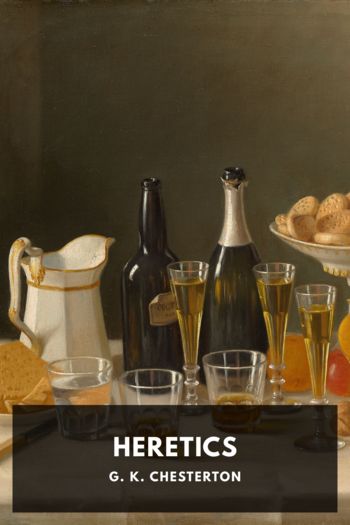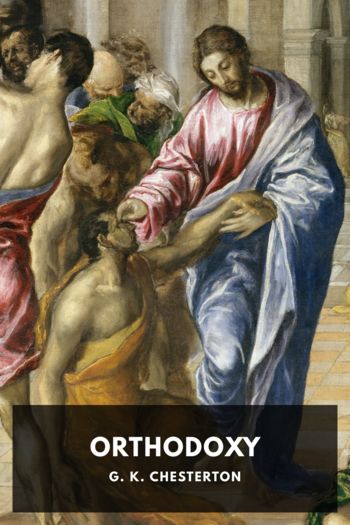Heretics by G. K. Chesterton (best way to read e books TXT) 📕

- Author: G. K. Chesterton
Book online «Heretics by G. K. Chesterton (best way to read e books TXT) 📕». Author G. K. Chesterton
Much has been said, and said truly, of the monkish morbidity, of the hysteria which as often gone with the visions of hermits or nuns. But let us never forget that this visionary religion is, in one sense, necessarily more wholesome than our modern and reasonable morality. It is more wholesome for this reason, that it can contemplate the idea of success or triumph in the hopeless fight towards the ethical ideal, in what Stevenson called, with his usual startling felicity, “the lost fight of virtue.” A modern morality, on the other hand, can only point with absolute conviction to the horrors that follow breaches of law; its only certainty is a certainty of ill. It can only point to imperfection. It has no perfection to point to. But the monk meditating upon Christ or Buddha has in his mind an image of perfect health, a thing of clear colours and clean air. He may contemplate this ideal wholeness and happiness far more than he ought; he may contemplate it to the neglect of exclusion of essential things; he may contemplate it until he has become a dreamer or a driveller; but still it is wholeness and happiness that he is contemplating. He may even go mad; but he is going mad for the love of sanity. But the modern student of ethics, even if he remains sane, remains sane from an insane dread of insanity.
The anchorite rolling on the stones in a frenzy of submission is a healthier person fundamentally than many a sober man in a silk hat who is walking down Cheapside. For many such are good only through a withering knowledge of evil. I am not at this moment claiming for the devotee anything more than this primary advantage, that though he may be making himself personally weak and miserable, he is still fixing his thoughts largely on gigantic strength and happiness, on a strength that has no limits, and a happiness that has no end. Doubtless there are other objections which can be urged without unreason against the influence of gods and visions in morality, whether in the cell or street. But this advantage the mystic morality must always have—it is always jollier. A young man may keep himself from vice by continually thinking of disease. He may keep himself from it also by continually thinking of the Virgin Mary. There may be question about which method is the more reasonable, or even about which is the more efficient. But surely there can be no question about which is the more wholesome.
I remember a pamphlet by that able and sincere secularist, Mr. G. W. Foote, which contained a phrase sharply symbolizing and dividing these two methods. The pamphlet was called Beer and Bible, those two very noble things, all the nobler for a conjunction which Mr. Foote, in his stern old Puritan way, seemed to think sardonic, but which I confess to thinking appropriate and charming. I have not the work by me, but I remember that Mr. Foote dismissed very contemptuously any attempts to deal with the problem of strong drink by religious offices or intercessions, and said that a picture of a drunkard’s liver would be more efficacious in the matter of temperance than any prayer or praise. In that picturesque expression, it seems to me, is perfectly embodied the incurable morbidity of modern ethics. In that temple the lights are low, the crowds kneel, the solemn anthems are uplifted. But that upon the altar to which all men kneel is no longer the perfect flesh, the body and substance of the perfect man; it is still flesh, but it is diseased. It is the drunkard’s liver of the New Testament that is marred for us, which we take in remembrance of him.
Now, it is this great gap in modern ethics, the absence of vivid pictures of purity and spiritual triumph, which lies at the back of the real objection felt by so many sane men to the realistic literature of the nineteenth century. If any ordinary man ever said that he was horrified by the subjects discussed in Ibsen or Maupassant, or by the plain language in which they are spoken of, that ordinary man was lying. The average conversation of average men throughout the whole of modern civilization in every class or trade is such as Zola would never dream of printing. Nor is the habit of writing thus of these things a new habit. On the contrary, it is the Victorian prudery and silence which is new still, though it is already dying. The tradition of calling a spade a spade starts very early in our literature and comes down very late. But the truth is that





Comments (0)